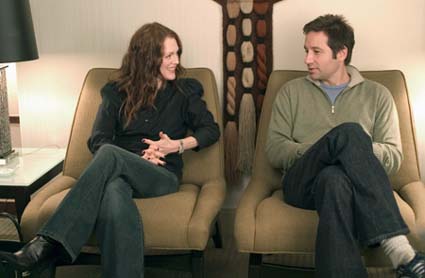|
Reviews of Recent Independent, Foreign, & Documentary Films in Theaters and DVD/Home Video
Directed & Written by: Bart Freundlich. Produced by: Tim Perrell, Freundlich & Sidney Kimmel. Director of Photography: Tim Orr. Edited by: John Gilroy. Music by: Clint Mansell. Released by: Fox Searchlight. Country of Origin: USA. 101 min. Rated: R. With: David Duchovny, Julianne Moore, Billy Crudup, Maggie Gyllenhaal, James Le Gros, Eva Mendes, Ellen Barkin & Garry Shandling.
Yet another comedy about self-absorbed New Yorkers – is there any other kind? –
Bart Freundlich’s affable but vacant examination of contemporary relationships covers the same downtown turf as a certain HBO phenomenon.
(Yes, Virginia, there really is a Magnolia Bakery. And only in the movies or Sex & the City would a young couple, one a freelance writer and the other a publishing assistant, be able to afford a one bedroom in the heart of Greenwich Village.) Together for seven years, twentysomething Elaine (this summer’s ubiquitous Maggie Gyllenhaal) wants to marry and start a family, while 36-year-old Tobey (Billy Crudup in full-charm offensive) is too afraid to commit. (He’s aptly described by his older sister Rebecca (Julianne Moore) as a teenager with a bank account.) Ingratiating but not working hard to be so, Crudup’s Tobey can get away with announcing after a trip to the bathroom that he has digested last night’s corn without completely turning off the audience.
Rebecca’s also spot-on about her own spouse, advertising-copywriter-turned-Mr. Mom, Tom: he’s a rebel without a cause.
Her succinct analysis of their stalling marriage takes the place of dramatization. Dialogue isn’t foreplay or a battle of wit;
it’s therapy over dinner and drinks. And it’s not as if these characters and their problems weren’t already familiar.
The forty-ish husband with the wandering libido and his knowing wife are a staple in two recent bourgeois marital dramedies,
last year’s whimsical but weighty Happily Ever After and the belated male coming of age Italian film The Last Kiss.
But Trust the Man only scratches the surface where those films made deeper and more revealing cuts.
Though not seeing the forest for the trees, otherwise self-aware Tom diagnoses himself as a sex addict, clumsily
participating in a self-help group in one of the more laden scenes. On the other hand, Moore’s Rebecca’s blow-by-blow description and harsh criticism of a porno film in a half-hearted attempt to turn on her husband may be a cheap shot, but it’s a hilarious one nevertheless.
It wouldn’t be surprising if Moore and Gyllenhaal are close confidants in real-life as they are here. But as Tom,
David Duchovny does not break new ground. His signature deadpan understatement suits his passive character, but Duchovny seems bemused or perplexed, not quite fully engaged with
the rest of the ensemble. However, Freundlich has lightened up considerably since the family angst of The Myth of Fingerprints. The real surprise is his all-out Hollywood ending, with swelling music, crowds of strangers cheering the couples on, and rose petals tossed in the air. With irony thrown out the window, he may have to turn in his indie card.
Kent Turner
|

